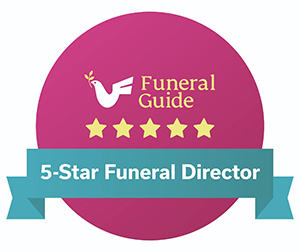Choosing a funeral finance plan through a local funeral director not only makes financial sense, but it greatly reduces pressure on family and friends during a very difficult time. Funeral finance can give you the freedom to enjoy life with the peace of mind knowing that the costs of your funeral have been taken care of for when the inevitable happens. Here is what you and your loved ones stand to gain by taking out a funeral finance plan with your local funeral director.
The Current Cost of Funerals in The UK
The total amount that a funeral costs depends on many different factors that are largely determined by the location of the funeral, the overall size of the funeral, any special requests and other associated fees.
But, the question is, how much is a funeral going to cost an average person?
The average cost of a funeral in the UK is currently £4,417, with the average cost of a traditional burial being £4,975 and the average cost of a cremation being a lot less at £3,858. These current figures suggest that the average cost of a funeral could increase to almost £5,300 by as early as 2024.
Like we previously mentioned, you will up paying less or more depending on where you live and your personal preferences, but that is roughly how much a funeral costs in the UK. For example, the average cost of a basic cremation in London is roughly £3,200 while it’s considerably lower at £2,800 in Belfast.
At the very top of the scale, those who live in London pay on average £5,963 for a funeral, while those in Northern Ireland pay £3,489 on average (Northern Ireland is one of cheapest places to have a funeral in the UK).
Sources:
- https://www.goldencharter.co.uk/news-and-info/2019/how-much-does-a-cremation-cost/
- https://www.sunlife.co.uk/funeral-costs/
- https://www.thisismoney.co.uk/money/pensions/article-7849249/Price-funeral-2020-4-417-budget-cremation-far-less.html
Breaking Down The Costs
The average cost of a funeral becomes a lot clearer when you break down the different contributing factors. Of course, everyone’s circumstances are different, but funeral fees and the total amount will typically include funeral director fees, transportation and service costs, and burial or cremation costs.
While the wishes that you leave in your Will usually determine whether you are buried or cremated, the cost of both can vary quite considerably. If you are not sure what you want, then it’s worth considering that cremations can cost a significant amount less.
Now, let’s breakdown these different contributing factors, so you get the bigger picture.
Burial Costs
As you will have seen from our earlier costs comparison, burials are on average, more expensive than cremations. Despite being a more traditional method, the cost of burials is only going to increase as more people choose cremation instead. The costs associated with a burial often include:
- Fees to cover the place of worship.
- Memorial costs.
- Fees regarding a headstone.
- Burial plot and maintenance costs.
- Fees to cover the minister or officiant.
Cremation Costs
The cost of a cremation typically depends on different factors (which we will list below), but they are generally less expensive than burials. Cremation fees are only £159 on average in the UK, which is far more affordable than the £1,960 that you would pay in burial fees. A cremation as a whole costs £3,858 in the UK, which is over a thousand pounds cheaper than the entire cost of burial, which stands at £4,975.
But, in addition to cremations fees, there are other costs associated that include:
- Fees to cover the minister or officiant.
- Doctors’ fees (for cremation certificates and documents).
- Memorial costs.
- Local cremation costs.
- Fees for the internment of ashes (this is the equivalent of a burial plot where the ashes will be kept in a permanent location.
Optional costs typically cover special requests and other features that are added to a basic funeral service. These are costs that you might not necessarily need but could want as a personal preference. For example, flowers, catering and order of service sheets. But remember that some of these costs could be included within the price that some funeral directors charge, so make sure to check their available packages first.
The Benefits of Opting for Funeral Finance
It’s really difficult to know when to start preparing for your own funeral service, but avoiding doing so can leave your family in financial trouble. However, below we list why you should opt for funeral finance and what the benefits of doing so are.
Peace of Mind
One of the most significant benefits of funeral finance is peace of mind. Losing a loved one is always very difficult and incredibly upsetting. Financial stress is something that many families just simply can’t bear to suffer at such a time. This is one of the biggest benefits of funeral finance. It’s a way of ensuring that your family don’t have the stress of organising and raising funds for your funeral at an already emotionally challenging time.
You Get To Choose Your Funeral Director
If you pass away without having pre-paid for your funeral or have a Will in place that states your preferred funeral director, then it will be down to your family to cover the costs and choose who will handle your funeral arrangements. However, if you choose to opt for funeral finance, you will able to take out a plan and pay for it with your preferred funeral director.
You Can Choose Your Payment Term
When you opt for a funeral finance plan, you are able to choose how much you want to pay and how long for just like many other financial products. The majority of people choose to repay the full cost of their plan over a 12 month term. But, for those who need longer can spread the cost over up to 48 months instead.
Reduce Inheritance Tax
Funeral finance can be a great way of reducing inheritance tax. This is because you will have already invested the money prior to your death. Without have a funeral finance plan in place and paid in full, your family would need to use funds from your estate, which may be subject to inheritance tax.
Things to Consider Before Opting for Funeral Finance
If you believe that funeral finance is for you, please follow our tips below to make sure you choose the right option that suits your personal needs.
Think About How Your Family Would Cope
Funeral finance is designed to help meet the cost of your funeral for when the inevitable happens, so it’s important to think about your family finances and how they would cope. Even if you think that your estate could cover the cost of your service, funeral prices are only going to increase further in the future so opting for a funeral finance plan might be the best option.
Do Your Research
When it comes to buying financial products, it’s very important to do your own research before making a decision. And, funeral finance is no exception. Remember that setting up a funeral finance plan can be complex when it comes to the finer details so if you are unsure about any details, then it’s important to ask the provider you have chosen.
Pay for Your Funeral Finance Plan as Quickly as You Can
Like many other financial products such as home and car insurance, funeral finance providers give you the option to pay in either monthly instalments or in a lump sum. However, paying in instalments over a long period of time will cost more because of interest and administration fees.
Make Sure You Can Afford It
It’s worth us mentioning that funeral finance isn’t suitable for everyone as it is credit agreement. If you cannot afford to repay the money, then there is a risk of getting yourself into debt. So, it’s worth exploring your options in detail before going ahead.
Who is Eligible for Funeral Finance?
Funeral finance is a type of credit agreement, so you will only be considered if you are the following:
- Over the age of 18.
- Are in full-time or part-time employment (16 hours per week minimum), unless you are retired and receiving a pension.
- Are a permanent resident in the UK and have lived in the country for at least 3 years.
- Have a bank account that is capable of accepting direct debits.
- Have a good credit history.
Are There Funeral Finance Alternatives?
Funeral finance is one way to ensure that your family doesn’t have to pay thousands of pounds when you pass away. But it is not the only way you can meet the costs of your funeral. Money from your estate, a life insurance possible and traditional savings account can all be possible alternatives, but they do all have their drawbacks.
Over 50s Life Insurance
An over 50s insurance plan will pay out a fixed lump sum to your family when you die to cover your funeral expenses, but there is a significant drawback to this option. The fixed lump sum payment will not have increased with inflation which means you could end up paying more money in premiums than you can claim. A good example of this would be if you bought a £10 a month life insurance policy with Aviva at the age of 50. This policy would pay out £2,767, but by the time you reach the age of 73, you would have already paid this amount in premiums. However, medical screening isn’t required for this financial product which means that it can be handy for those who cannot afford standard life insurance because of any pre-existing medical conditions.
Savings Accounts
Using a savings account means that you can grow your money with added interest. However, the rising cost of funeral expenses means that you might not earn enough interest to keep up the prices. If you do wish to choose this alternative, then it’s important to make sure that your close relatives can access your savings account after you die. To do this, set up the account in a joint name with a family member that you fully trust.
Paying From Your Estate
The cost of your funeral can also be covered by using the money from your estate when you die. The majority of banks will release funds if they are presented with an itemised statement and a copy of your death certificate from a funeral director.
Funeral Finance With S. Stibbards & Sons
At S. Stibbards & Sons, we know that a funeral can be costly and often an unexpected expense. Finding the necessary money at very short notice can be a big strain, especially at an already emotionally challenging time and when there are so many other things to care of. But, that’s where we come in.
Our funeral finance plans are flexible, and can be specifically tailored to your requirements and personal circumstances. Many people choose to repay the full cost of the funeral over 12 months, but if you need longer, then you can choose to spread the cost over 36 or 48 months instead. We are also trusted and appointed representatives for Funeral Safe Finance Ltd.
If you would like to discuss funeral finance with one of our friendly and compassionate funeral arrangers, then please contact us today. We can talk you through the different options we have available and answer any questions or queries that you might have. Just call us on (01702) 558717, we are available 24 hours a day.







